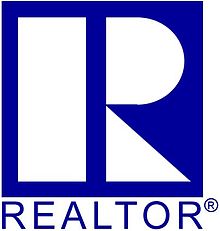- National Association of Realtors
-
This article is about a real estate trade association. For general information about real-estate brokers in the United States, see Real estate broker.
The National Association of Realtors (NAR), whose members are known as Realtors, is North America's largest trade association.[1] representing over 1.2 million members[2] (as reported November 2008), including NAR's institutes, societies, and councils, involved in all aspects of the residential and commercial real estate industries. NAR also functions as a self-regulatory organization for real estate brokerage. The President of NAR for 2011 is Ron Phipps.[3] The organization is headquartered in Chicago.
Contents
Overview
The National Association of Realtors was founded on May 13, 1908 as the National Association of Real Estate Exchanges, the founding group being located in Chicago, Illinois. In 1916, the National Association of Real Estate Exchanges changed its name to The National Association of Real Estate Boards. The current name was adopted in 1974.
NAR's membership is composed of residential and commercial real estate brokers, real estate salespeople, immovable property managers, appraisers, counselors, and others engaged in all aspects of the real estate (immovable property) industry, where a state license to practice is required. Members belong to one or more of some 1,600 local Realtor boards or associations. They are pledged to a code of ethics and standards of practice,[4] which includes duties to clients and customers, the public, and other Realtors.
Local associations are required to enforce the code of ethics through a Professional Standards Council or Committee. Trained members of the association form hearing panels charged with the responsibility of hearing testimony and evaluating evidence from complaints filed by the public or other members against association members for alleged violations of the code of ethics. If the panel finds the member in violation, disciplines recommended may be one or more of the following: a letter of warning or reprimand, educational courses, suspension or expulsion of membership, fines up to $5,000 and probation. All recommended disciplines by professional standards hearing panels are subject to the ratification by the association's board of directors before the discipline takes effect.[citation needed]
The National Association of Realtors is also a member of The Real Estate Roundtable, a lobbying group in Washington, D.C.[5]
Trademark status
Realtor is a frequently-used word in many countries to describe any person or company involved in the real estate trade, regardless of their NAR status or American residence. However, in the United States, the National Association of Realtors in 1949 and 1950 obtained registrations for the words "REALTOR"[6] and "REALTORS"[7] as collective trade marks.
In 2003, Jacob Zimmerman, a student who was not a member of NAR, petitioned the U.S. Patent and Trademark Office to cancel the trademarks, on the ground that "REALTOR" and "REALTORS" were generic terms rather than a trademark. On March 31, 2004, the USPTO's Trademark Trial and Appeal Board denied the petition but left it open for appeal.[8]
NAR and Multiple Listing Service (MLS) systems
The NAR governs the hundreds of local Multiple Listing Services (MLSs) which are the information exchanges used across the nation by real estate brokers. (However, there are many MLSs that are independent of NAR, although membership is typically limited to licensed brokers and their agents; MLSPIN[9] is an example of one of the larger independent MLSs in North America.)
Through a complicated arrangement, NAR sets the policies for most of the Multiple Listings Services, and in the late 1990s, with the growth of the Internet, NAR evolved regulations allowing Internet Data Exchanges (IDX) whereby brokers would allow a portion of their data to be seen on the Internet via brokers' or agents' websites and Virtual Office Websites (VOW) which required potential buyers to register to obtain information.
These policies allowed participants—whether they were individual one-person brokers or large regional companies—to limit access to some or all of the MLS data by individual brokers (whether they were brokers operating solely on the Internet or local competitors). In 2005, this prompted the Department of Justice to file an antitrust lawsuit against NAR alleging its MLS rules in regard to these types of limitations on the display of data were the product of a conspiracy to restrain trade by excluding brokers who used the Internet to operate differently from traditional bricks-and-mortar brokers. (For a description of the DOJ action, see Antitrust Case filings for US v. National Association of Realtors.[10]) Meanwhile various real estate trends such as expanded consumer access and the Internet are consolidating existing local MLS organizations into larger and more statewide or regional MLS systems, such as in California and Virginia/Maryland/Washington DC's Metropolitan Regional Information Systems.
In response to the case, NAR had proposed setting up a single Internet Listing Display system which would not allow participants to exclude individual brokers (whether of a bricks-and-mortar type or solely internet-based) but require a blanket opting out of display on all other brokers' sites.[citation needed] This system became the IDX system. Although IDX allows the public to view MLS listings, it still requires the listing brokerage information to be placed on the listing every place it appears (brokers legally "own" the listings of their brokerage), in order to prevent misrepresentation of the listing information, and to place accountability for the information on the broker as the law dictates.
The antitrust lawsuit was settled in May 2008.[11] The agreement mandates that all Multiple Listing Service systems allow access to Internet-based competitors.[11][12] The NAR will be required to treat online brokers the same as traditional brokers and cannot exclude them from membership because they do not have a traditional business model.[13] The NAR admitted no wrongdoing, and it paid neither fines nor damages as part of the deal.[13] The settlement will not be official until a federal judge formally approves it, most likely in Template:As of 2008.[13] While the general counsel of the NAR believes that the settlement will have no effect on the commission paid by the general public, a business professor at Western Michigan University predicted that the increased competition would cause a 25 to 50 percent decrease in commissions.[13]
Another major anticompetitive practice is supported (indirectly) by various state laws which prohibit the "sharing" of commissions with unlicensed individuals. In broad interpretations, this is deemed to prevent a buyers' agent from providing a credit to his or her buyers from commissions received. Currently, there are 10 states where real estate agents and brokers are barred from offering homebuyers or sellers cash rebates or gifts of any kind with a cash value more than $25.Various Realtors in such states have successfully contested this interpretation in states which now allow the practice (Notably, Patrick Lea a Realtor in Ohio, and numerous agents in Kentucky). The Kentucky case was ultimately tried with the United States Department of Justice as the plaintiff and the Kentucky Real Estate Commission as the defendant. http://www.justice.gov/atr/cases/f210200/210274.htm
NAR educational requirements and recognized designations
As adherents to NAR's code of ethics, Realtors are required to update their acquaintance with the code every four years by taking a course, available online or in person.
However, Realtors, as members of NAR, also have the option of studying for additional certifications in a variety of specialties, several of which are backed by NAR with offerings of certification and update courses available nationwide.[14]
The most well known NAR sponsored designations are the following:
- Accredited Buyer Representative (ABR). The Real Estate Buyers Agent Council has over 40,000 members and is the largest association of real estate professionals focusing on all aspects of buyer representation. Of the REBAC members, over 30,000 have completed REBAC's two-day course and provided documentation of buyer agency experience. Linked to the ABR is the ABRM, Accredited Buyer Representative Manager (ABRM) for managers.
- Accredited Land Consultant (ALC). ALC's are specialists in land brokerage transactions, including farms and ranches, raw land sales and development.
- Certified Commercial Investment Member (CCIM). CCIMs are specialists in commercial real estate brokerage, leasing, valuation and investment analysis. There are more than 7,500 designees and an equal number of candidates principally in North America, but also in Asia and Europe.
- Certified Property Manager (CPM). Geared to real estate property management specialists, designees handle all forms of management from residential to commercial to industrial.
- Certified Real Estate Brokerage Manager (CRB). The designation is awarded to Realtors who have completed the Council's advanced educational and professional requirements.
- Certified Residential Specialist (CRS). CRS Designees earn a median income of $85,000 annually, nearly 3 times the $29,400 median income of Realtors® serving as sales associates.[15] They also average a total of 21 transactions per year with gross sales of $3.2 million.[15] Requirements for this designation include a total of at least 25 transactions (or specific volume of sales) over a specific time period, and significant experience, as well as educational requirements.
- Certification for Internet Professionalism (e-PRO). An e-PRO is a Realtor who has undergone a new training program presented entirely online to be certified as Internet Professionals. NAR is the first major trade group to offer certification for online professionalism which involves all aspects of doing business on the internet. This is not a designation but rather a certification sponsored by NAR.
- Certified International Property Specialist (CIPS). Realtors with the CIPS designation have training and hands-on experience in international real estate transactions, Whether traveling abroad to put transactions together, assisting foreign investors, helping local buyers invest abroad, or serving an immigrant niche in local markets. CIPS designees have also completed a program of study focusing on critical aspects of transnational transactions, including currency and exchange rate issues and cross-cultural relationships, regional market conditions, investment performance, tax issues and more. The CIPS network consists of 1,500 real estate professionals from 50 countries.
- Counselor of Real Estate (CRE). A CRE designee is one of only 1,100 by-invitation-only members of an international group of professionals who provide seasoned, objective advice on real property and land-related matters.
- Graduate of the Realtor's Institute (GRI). The GRI designation is held by 19% of Realtors and courses are offered through state Realtor associations with 90 hours of coursework on marketing and servicing listed properties to real estate law. In a 2003 survey, NAR has determined that GRIs earned over $33,200 more annually than non-designees.
- Real Estate Professional Assistant (REPA). Designed for administrative assistants or employees of Realtors (who may or may not hold a real estate license), a two-day certificate course provides an intensive introduction to the real estate business and to the specific ways support staff can become valuable assets to their employers.
- Seniors Real Estate Specialist (SRES). The SRES is a designation for Realtors to address the needs of home buyers age 50-plus, the largest and wealthiest buyer's group in the country. SRES is a council of REBAC, a wholly owned subsidiary of The National Association of Realtors.
Contributions to political campaigns
The NAR wields substantial power as a lobbying organization on behalf of agents and brokers; in 2005, NAR had the largest Political Action Committee in the United States. According to the Center for Responsive Politics, the association is the United States' third-largest donor to political campaigns, having given since 1990 more than US$30 million. Of this sum, an average of 47% has gone to Democrats and 53% to Republicans.[16] Key political issues for the group revolve around federal regulation of the financial services industry.
Radio
The NAR backs a weekly 2-hour radio program entitled Real Estate Today hosted by Gil Gross. The show includes a 3-minute segment reporting on market conditions at the bottom of each hour, optional for stations to air.[17] The program is produced by Media Syndication Services and distributed by Premiere Radio Networks, and is heard on dozens of affiliates nationwide, and the Talk Radio channel on XM Radio.
Consumer outreach
The NAR launched HouseLogic.com[18] in February 2010 in an attempt to reach consumers directly for the first time.[19] Beyond establishing that bond with consumers, the goal of the site is to provide education—with much commercial interests—to consumers about investing in their homes.
Other national real estate associations
- Canadian Real Estate Association
- National Association of Estate Agents
- National Association of Real Estate Brokers (NAREB)
- National Association of Hispanic Real Estate Professionals (NAHREP)
See also
- Real estate broker
- Real estate trends
- Estate agent
- List of real estate topics
- United States housing bubble
- Housing Affordability Index
- Comparison of real estate websites
References
- ^ National Trade and Professional Associations (2008), 43rd ed., ISBN 978 1-880873-56-4
- ^ NAR's current membership report
- ^ Charles McMillan, GRI, CIPS, President - NATIONAL ASSOCIATION of Realtors
- ^ NAR's 2007 code of ethics and standards of practice
- ^ "Lobbying Spending Database : National Assn of Realtors : 2007". http://www.opensecrets.org/lobby/clientsum.php?lname=National+Assn+of+Realtors&year=2007. Retrieved 2008-10-25.
- ^ United States Patent and Trademark Office, reg. no. 519,789, "REALTOR"
- ^ United States Patent and Trademark Office, reg. no. 515,200, "REALTORS"
- ^ Jacob Zimmerman v. Nat'l Ass'n of Realtors, Cancellation Nos. 92032360, 92040141, U.S. Patent and Trademark Office, Trademark Trial and Appeal Board (March 31, 2004)
- ^ MLSpin website
- ^ United States v. National Association of Realtors. United States District Court for the Northern District of Illinois, Eastern Division. 2008-05-27. Retrieved 2008-05-27.
- ^ a b Bartz, Diane. Realtors to open listings to settle lawsuit. Reuters. 2008-05-27. Retrieved 2008-05-27.
- ^ Jordan, Lara Jakes. Settlement opens listings to online real estate agents. Associated Press. The Mercury News, Silicon Valley. 2008-05-27. Retrieved 2008-05-27.
- ^ a b c d Lichtblau, Eric. Realtors Agree to Stop Blocking Web Listings. The New York Times. 2008-05-28. Retrieved 2008-05-27.
- ^ NAR Accredited Designations & Courses. National Association of Realtors.
- ^ a b Membership Stats & Surveys http://www.crs.com/About_CRS/55
- ^ Center for Responsive Politics's report on NAR's support of Democratic and Republican parties, 1990 to 2006, retrieved 21 June 2007
- ^ RETRadio.com
- ^ http://www.houselogic.com/
- ^ Scene, Local (2010-02-26). "Realtors looking for special bond with consumers". Chicago Tribune. http://www.chicagotribune.com/news/opinion/ct-home-0226-local-scene-chomes-20100226,0,7154893.column.
External links
- Official website
- Kirstin Downey, "Realtors Back Away From Plan To Restrict Access to Listings" The Washington Post, September 8, 2005
- NAR Grassroots Advocacy
- National Association of Realtors Political Action Group (PAC)
- HouseLogic
- Mary Ellen Podmolik "Realtors looking for special bond with consumers" "The Chicago Tribune", February 26, 2010
Categories:- Real estate industry trade groups
- Organizations based in Washington, D.C.
- 1908 establishments in the United States
- Real estate in the United States
Wikimedia Foundation. 2010.




